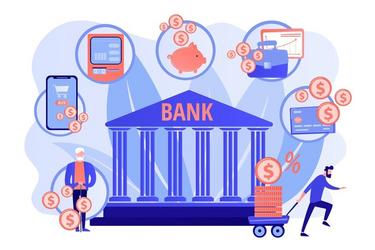An alternative to the banking sector
Cryptocurrencies[1] have emerged as a significant alternative to traditional banking, offering a new paradigm for conducting financial transactions without the need for centralized institutions. By leveraging blockchain[2] technology, cryptocurrencies enable peer-to-peer transactions, reducing reliance on banks and other financial intermediaries. This shift promises to democratize finance, enhance accessibility, and foster financial inclusion[3] globally.
- Disrupting Traditional Finance
- Benefits of Cryptocurrency Over Banking
- Challenges in Adopting Cryptocurrencies
- The Future of Banking with Cryptocurrencies
- An alternative to the banking sector
- Fintech Innovations: Revolutionizing Finance
- Blockchain and Cryptocurrencies: The New Frontier
- Neobanks and Challenger Banks: Redefining Banking
- Peer-to-Peer (P2P) Lending: Empowering Individuals
- Crowdfunding: Financing Innovation and Entrepreneurship
- Microfinance and Financial Inclusion
- The Role of Regulatory Technology (RegTech)
Disrupting Traditional Finance
Cryptocurrencies challenge the traditional banking model by offering decentralized financial services. This disruption is evident in areas such as international remittances, where cryptocurrencies can facilitate faster and cheaper transactions compared to conventional banking channels.
Benefits of Cryptocurrency Over Banking
The advantages of cryptocurrencies over traditional banking include:
- Lower Transaction Fees: Cryptocurrencies typically incur lower transaction fees than traditional banking systems.
- Increased Accessibility: Cryptocurrencies provide financial services to unbanked and underbanked populations, enhancing financial inclusivity.
- Enhanced Security and Privacy: Cryptographic security measures protect transactions and user identities, offering more privacy than traditional banking.
Challenges in Adopting Cryptocurrencies
Despite the potential, the adoption of cryptocurrencies as an alternative to banking faces challenges:
- Volatility[5]: The high volatility of cryptocurrencies can pose risks for users and businesses.
- Regulatory Uncertainty[6]: The evolving regulatory landscape[7] for cryptocurrencies can impact their adoption and use as alternatives to traditional banking.
- Awareness and Understanding: Widespread adoption requires greater awareness and understanding of cryptocurrencies among the general population.
The Future of Banking with Cryptocurrencies
The integration of cryptocurrencies into the global financial ecosystem[8] could redefine the future of banking, offering more efficient, inclusive, and flexible financial services. The ongoing development of regulatory frameworks and technological advancements will play a crucial role in shaping this future.
An alternative to the banking sector
In the quest for more inclusive, efficient, and cost-effective financial services, various alternatives to the traditional banking sector have emerged. These alternatives seek to address the limitations and challenges of conventional banks, including high fees, accessibility issues, and the need for faster, more transparent transactions. This exploration leads us into a realm where technology-driven solutions pave the way for a new era of financial services.
Fintech Innovations: Revolutionizing Finance
Fintech, or financial technology, companies use technology to enhance or automate financial services and processes. These innovations range from mobile banking and peer-to-peer payment platforms to robo-advisors and digital wallets. Fintech solutions offer a more user-friendly, accessible, and often cheaper alternative to traditional banking, making it easier for consumers to manage their finances without stepping into a bank.
Blockchain and Cryptocurrencies: The New Frontier
Blockchain technology and cryptocurrencies represent a radical shift from traditional banking, offering a decentralized approach to financial transactions. Cryptocurrencies like Bitcoin[9] and Ethereum[10] allow users to transact directly with each other without the need for intermediaries, potentially reducing transaction costs and increasing transaction speed. Blockchain’s transparency[11] and security features also offer significant advantages over conventional banking systems.
Neobanks and Challenger Banks: Redefining Banking
Neobanks, also known as challenger banks, are digital-only banks without any physical branches, offering banking services through mobile apps and web platforms. These banks often target specific customer needs with lower fees, better rates, and enhanced customer experience compared to traditional banks. Their agile and customer-centric approach has made them particularly popular among tech-savvy consumers and those seeking more personalized banking services.
Peer-to-Peer (P2P) Lending: Empowering Individuals
P2P lending platforms connect borrowers directly with investors, bypassing traditional banking and lending institutions. This model can offer more competitive interest rates, lower fees, and a more straightforward application process. P2P lending not only democratizes access to financing but also opens up new investment opportunities for individuals.
Crowdfunding: Financing Innovation and Entrepreneurship
Crowdfunding platforms allow entrepreneurs, artists, and creators to raise funds directly from the public for their projects or ventures. This alternative financing method provides a platform for innovation and entrepreneurship, enabling ideas to come to life without the need for traditional bank loans or venture capital.
Microfinance and Financial Inclusion
Microfinance institutions provide small loans, savings accounts, insurance, and other financial services to underserved populations, including those in developing countries. By offering access to financial services to those traditionally excluded from the banking system, microfinance plays a crucial role in promoting financial inclusion and empowering individuals and communities.
The Role of Regulatory Technology (RegTech)
RegTech, or regulatory technology, uses technology to help financial service providers meet compliance[13] and regulatory requirements more efficiently and effectively. This includes solutions for anti-money laundering (AML), know your customer (KYC) processes, fraud detection, and reporting. RegTech can play a supportive role for alternative financial services, ensuring they remain compliant while innovating.
In conclusion, the landscape of financial services is undergoing a significant transformation, driven by technological advancements and a shift towards more inclusive, efficient, and transparent financial solutions. These alternatives to the traditional banking sector not only challenge the status quo but also offer the potential for a more democratized financial system that serves a broader spectrum of society’s needs.
- Cryptocurrencies — Digital or virtual currencies that use cryptography for security and operate on a decentralized system, unlike traditional currencies.
- Blockchain — A decentralized digital ledger recording cryptocurrency transactions across multiple computers.
- Financial Inclusion — The availability and equality of opportunities to access financial services.
- Cryptocurrency — Digital or virtual currency secured by cryptography, facilitates secure, anonymous transactions.
- Volatility — Rapid and significant price movement, a common characteristic of cryptocurrencies.
- Regulatory Uncertainty — The lack of clear regulatory guidelines and frameworks governing the use and trading of virtual assets.
- Regulatory Landscape — The set of laws, guidelines, and policies that govern the use of virtual assets across different regions.
- Global Financial Ecosystem — The worldwide financial system encompassing all financial institutions, markets, assets, and regulatory bodies.
- Bitcoin — The first and most well-known cryptocurrency, was introduced in 2009 by Satoshi Nakamoto, who developed Bitcoin.
- Ethereum — A blockchain platform with its own cryptocurrency, Ether, is known for smart contract functionality.
- Transparency — The characteristic of blockchain technology that allows all transactions to be visible and verifiable by all network participants.
- Crowdfunding — The practice of funding a project or venture by raising small amounts of money from a large number of people, typically via the Internet.
- Compliance — The act of adhering to legal standards and regulations established by governmental bodies and regulatory agencies, particularly in the context of financial operations and transactions involving cryptocurrencies.
- Nakamoto, Satoshi. 'Bitcoin: A Peer-to-Peer Electronic Cash System', 2008.
- World Bank. 'The Global Findex Database', 2017.
- Cambridge Centre for Alternative Finance. 'Global Cryptocurrency Benchmarking Study', 2017.



